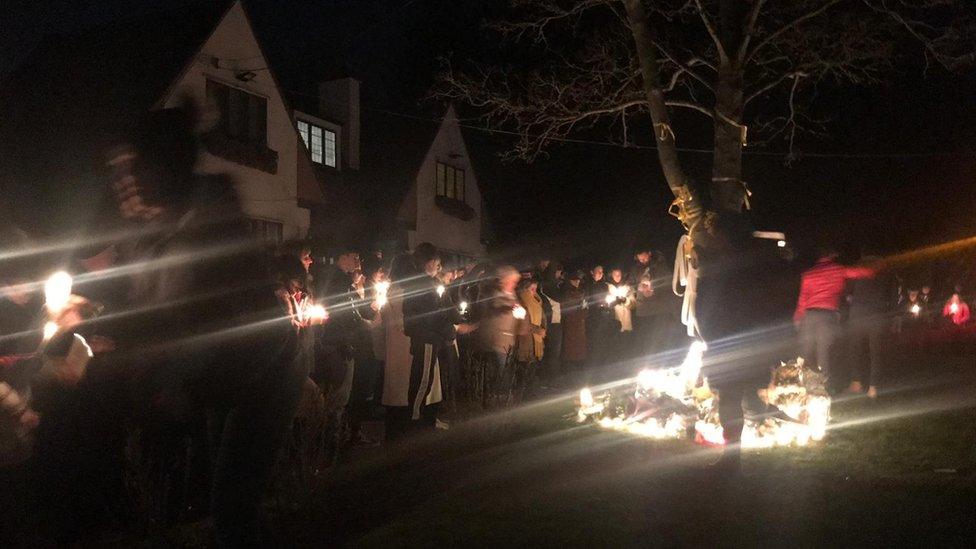Grace Millane death: Prosecution presents first evidence
- Published

Miss Millane had been travelling alone in New Zealand
The suspect in the death of British backpacker Grace Millane went on a Tinder date while her body was in a suitcase in his room, a court heard.
The revelation came as the first evidence was presented in the trial of the 27-year-old suspect, who cannot be named for legal reasons.
Ms Millane, 22, who was from Wickford, Essex, was last seen in Auckland, New Zealand, on 1 December last year, before her body was found a week later.
The suspect denies murder.
The family of Miss Millane sat in the Auckland court, metres away from the defendant.
Prosecutors allege the British woman was strangled to death in the man's apartment after the two met on the dating app Tinder.
The defence claim the death was an accident during consensual sex, saying "acts designed to enhance sexual pleasure went wrong".

'Her parents sat dignified, following the evidence'
Simon Atkinson, BBC News, Auckland
Grace Millane's parents sat in the front row of the public gallery as the prosecution, and then the defence, set out their versions of what happened to their daughter.
David Millane occasionally glanced across at the man accused of Grace's murder. Gillian Millane winced as a police officer described how her daughter's body was positioned in the suitcase uncovered in a shallow grave.
Despite the agonising details about what happened in their daughter's final hours, the Millanes sat dignified, closely following the evidence from the back of the room.
And in his statement that was read to the court, Mr Millane talked about his gregarious "Gracie", who made friends easily and loved her family.
"I don't believe young people tell their parents everything," he said. "And nor should they."

Crown prosecutor Robin McCoubrey told the jury that Ms Millane and the defendant met via the dating app Tinder and went to several bars in the city centre.
"They were plainly comfortable in one another's company that evening," he said. "From the footage, you'll see them kissing. Both parties probably anticipated sexual activity."

Grace Millane's parents attended the Wednesday court hearing
Mr McCoubrey said the defendant initially told police the pair had drinks and then went home separately.
He later changed his story to say they had engaged in rough sexual intercourse involving biting and hitting, Mr McCoubrey said.
The defendant told the police he then first fell asleep in the shower and later went to bed but discovered Ms Millane's body only the next morning.
"I woke up the next day and saw that she was lying on the floor," Mr McCoubrey quoted the defendant as saying. "I saw that she had blood coming from her nose."
'Not distressed by her death'
The Crown prosecutor explained that the young woman had "bruises that were consistent with restraint" on her body and that "it is the Crown's case that Ms Millane was strangled".
He also explained that, later that night, the suspect searched online for how to dispose of a body.
"He wasn't distressed or concerned by her death," he said, adding the suspect then began searching pornography.

The prosecution believes the suspect was not concerned or distressed by the death
The defendant at one point allegedly broke off his internet search to take intimate photos of Ms Millane's body.
He then resumed visiting pornographic websites, before searching for "large bags near me" and "rigor mortis".
The following day, he went on a Tinder date with another woman with the body of Ms Millane still in the apartment.
The court heard he buried her later in a suitcase in the Waitakere Ranges, near Auckland.
Members of Grace Millane's family carried her coffin
Miss Millane's death prompted an outpouring of public grief in New Zealand with the country's Prime Minister Jacinda Ardern apologising to her family.
The young woman had been on a round-the-world trip, travelling alone in New Zealand for two weeks, following six weeks in South America.
The trial is expected to last one month.
- Published12 December 2018

- Published12 December 2018

- Published10 December 2018

- Published9 December 2018
